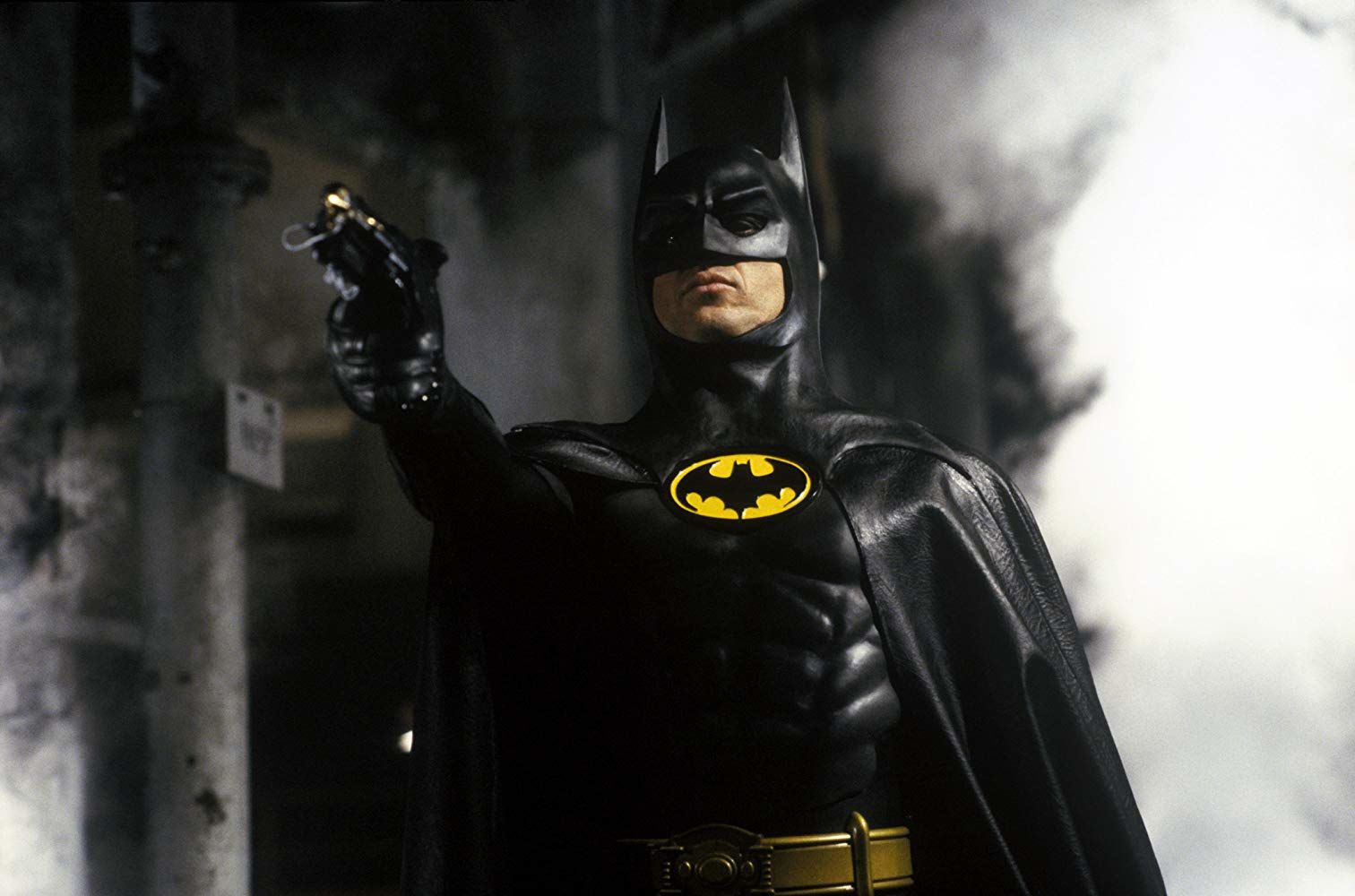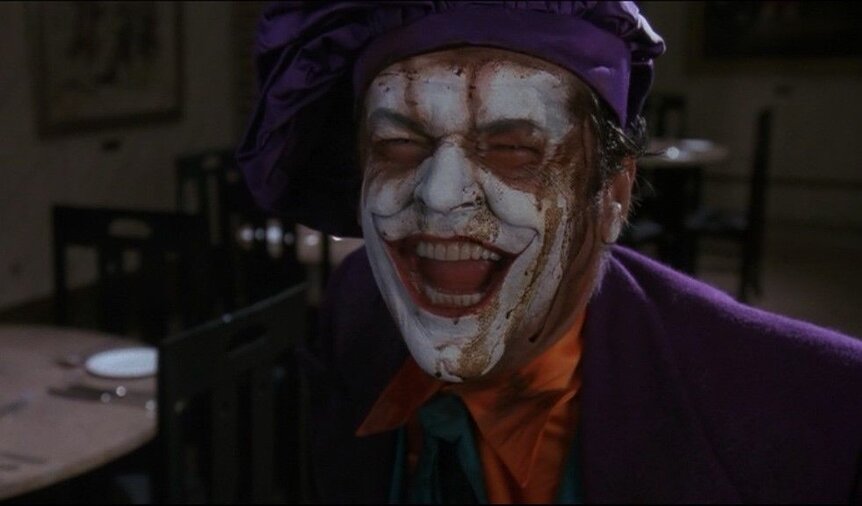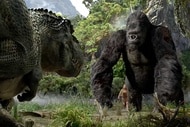Create a free profile to get unlimited access to exclusive videos, sweepstakes, and more!
How Tim Burton's Batman set the stage for comic books' Hollywood takeover

Now that people can't even talk civilly about Star Wars and winter came for Game of Thrones, superheroes have become the last bastion of American monoculture. And while they're supposed to work for the public good, comic book heroes have also settled in as the guardians of Hollywood, both powering and protecting the industry as it navigates new trends and technologies. Their stature belies their relatively recent rise, as the making of Tim Burton's Batman, released 30 years ago on Thursday, can be considered the superhero movie's origin story.
Richard Donner and Christopher Reeve's boy scout take on Superman was the first modern superhero blockbuster, but by the mid-'80s the franchise had become a cheap parody of itself and fallen out of favor with moviegoers. Warner Bros., the studio that produced the Superman movies, also owned the screen rights to Batman, but owing to the Man of Steel's fading popularity and Batman's more complicated and rather dark history, any attempts to bring the Caped Crusader to the cinema for the first time since 1966 had been stillborn.
Then producers Michael Uslan, Jon Peters, and Peter Guber, along with WB executive Bonnie Lee, brought on Tim Burton, a bright young filmmaker with a few off-kilter comedy hits on his resume, to attempt to jump-start Batman once again. He took a pass at the script, partnering with the writer Julie Hickson, and then sought even more help, which is where a green screenwriter and lifelong comics fan named Sam Hamm came into the panel. He had a development deal over at WB and hit it off quickly with Burton, providing the spark that the rather convoluted project had long lacked.
"It was kind of regarded as an albatross project at the time," Hamm remembered in a recent conversation with SYFY WIRE. "When I came in they were kind of deciding whether this was going to be their last gasp and whether they were going to let the rights lapse. When Tim and I came in, we basically said, 'How about if you just do it straight? Pretend that there is actually a human being who goes and does this stuff, and you figure out what are the consequences of that.'"
Stripping down the story to its bare essentials was a somewhat revolutionary suggestion in Hollywood, given the legacy of the ultra-colorful and busy '60s Batman TV show, but writers at DC had spent nearly two decades working to restore the sparse seriousness of the character in the comic books. And while Burton and Hamm were never going to make Bruce Wayne a sociopathic warrior, a la Frank Miller's The Dark Knight Returns, the simplification of the story proved to be just what was needed to capture the imaginations of the public in 1989.
The movie, starring Michael Keaton as Bruce Wayne and Jack Nicholson as the Joker, was a massive hit, taking in over $400 million at the box office and kicking off not only a franchise but a genre. SYFY WIRE spoke with Hamm about writing the movie, creating the prototype for the superhero origin, and what's come since.
Tim Burton came on shortly before you. He had written some kind of script with Julie Hickson. What do you remember of that?
The one thing I remember is that there was a parade at the end of the Julie Hickson draft. I think that's the main thing that we incorporated in it. It started out with a kind of traditional origin story, et cetera, et cetera. It had Robin. It seems to me that there were some gigantic props and stuff like that like in the comic books, the stuff that later winds up being a souvenir in the Bat Cave. But I truthfully do not remember it terribly vividly.
The opening to your movie is a fakeout — it starts with a kid and his parents being held up by a mugger, but as we soon discover, it's not the Wayne family. For Batman fans, it was clearly a tease and twist.
That was exactly what I had in mind. Nobody would know except the fanbase, of course. People that just knew Batman from the TV series wouldn't have any idea what they're seeing. But the idea absolutely was to lead the fanbase a little bit and then pull the rug out from under them. And just when they're going, "Wait a minute, this is not the origin story of Batman," plop, you drop Batman into the middle of the story and hopefully sort of knock them off their pins again.
That's one of the things that's fun about telling a story that most people already know part of, or they think they know part of it. You want to give them the stuff that they know, that they expect, but you want to give it to them in a kind of roundabout, hopefully unexpected way.
At this point, he's Batman, but the Dark Knight is still pretty green.
We knew from the beginning that we wanted to treat Batman as not an established character, but he's been around and he's kind of a rumor. He's a sort of legend in Gotham City. And the underworld seems to be scared about something, but nobody is quite sure what it is. So our first act plan was to do the origin story of the Joker, which is happening simultaneously with this, in some ways as a result of Batman's presence on the street. The opening scene is exactly what you said; it's a fakeout.
At that point, the only real superhero movie franchise was Superman, which had petered out, so there was no real blueprint for making these movies.
When I was approaching it, it was like, Superman, you've got a lot of things to explain. If you introduce Superman, how is he able to fly? Why can he see through walls? Why do bullets bounce off him? All of that kind of stuff like that. Also, with the explosion of Krypton and the kid being sent off in his rocket ship and landing safely on Earth, you've got a pretty good exciting opening sequence for your movie.
Whereas with Batman, there's really nothing to explain in terms of how he does it. It's a guy in a suit. That's all it is. It's some crazy guy puts on a cape and a mask and decides to go out and fight crime. So the question about him is not how can he do this; it's why does he do it. That was really the first conversation Tim and I had about the movie. Why does this rich guy do this? He's got all the money he could possibly want. He could devote it to philanthropy. He could make people's lives better. Whatever his impulses were, he could follow them.
He's got the resources to do all sorts of useful things in society, but the only thing that satisfies him is dressing up, going out on the street, kicking ass of petty criminals. So why is that? We kind of decided that had to be the central mystery of the movie.
So did you think of Bruce Wayne as crazy? That's not a far-fetched idea.
Bruce Wayne is a guy who has made a sort of crazy career decision, is the way that we put it. A bad thing happened to him a long time ago. He was rich. He came into possession of great wealth. He had no apparent authority figure in his life, except his employee. As far as everybody knows, the guy that raised Bruce Wayne was his butler. So if the butler says, "Master Bruce, this is crazy. You can't put on a suit and go out and fight crime," then Bruce could just say, "Alfred, you're fired. I'll find another butler."
So he didn't have any kind of steadying influence telling him, "You got to get over this. You got to put it all behind you and figure out something productive to do with your life." He was just able to sort of nurse his wound over all these years.
Then we thought, what if you had this guy who started off on this project and he's just in the first few weeks of it, and some of it's working and some of it's not working, and he's still trying to figure out what's working and what's not working. He starts to think, "What if I could have a normal life?" In other words, what if Bruce Wayne started to go sane? That was our story.
You can tell that Batman isn't really good at being Batman yet.
He's going to have all this stuff that he's built, but it's not field-tested. How do you try this stuff out except to go out and use it in practice? So occasionally his technology is going to work for him; occasionally it's not going to work for him. Occasionally he doesn't quite know what the capabilities of it are.
So there are moments where you see the shields on the Batmobile, and you go, "Oh, wow, that's cool. That's a practical solution to an obvious problem," which is how do you park the Batmobile. Do you leave the Batmobile with the valet and tip him five bucks when you come back in your cape and your utility belt and you're all bloody? Or do you have some different practical way of handling it.
The other side of that is, like he's got his little reel on the belt of his costume that is strong enough to hoist him up 10 stories. But it's not strong enough to hoist him and Vicki up 10 stories. So he winds up kind of dangling in mid-air when the reel is not strong enough.
He's not a world-class fighter yet, which is one reason why Michael Keaton worked so well in the part, despite peoples' suspicions.
There were a lot of people at Warner Brother who wanted to cast it with an action star. They wanted to cast the part as Batman, as opposed to casting it as Bruce Wayne. You have to make Bruce Wayne work, because Batman is, for the most part, going to be a stunt guy, or it's going to be somebody running around in a costume in long shot. You don't need the martial arts expertise of, say, Steven Seagal or somebody like that, because you can fake all of that kind of stuff. Seagal was one of the people that was suggested to us.
Really? Steven Seagal?
Believe it or not. He had just kind of appeared on the scene, people thought holy cow, this guy's badass. He could be Batman. I don't think it ever got to the point where he read for it. He was just one of the names that was floated.
At one point in an old version of a screenplay, before you came on, Silver St. Cloud was involved — she was replaced by Vicki Vale. Was there ever a time you wanted to bring in more villains or characters, beyond the Joker?
Nobody had ever really broached to us the idea that you would bring together a couple or three or four villains, or put them together as some kind of league of weird bad guys. We were starting out at a point where Batman is kind of a newcomer; he's new to the job, and he hasn't been around long enough to attract this whole sort of menagerie of weirdos who crop up regularly in the comics because you have another issue of Batman every month, so you've got to have some new creep to fight with. That hasn't happened yet.
The character exists in a world where there are no other superheroes that we know. We weren't pretending that Superman was two cities over and the Flash was three cities past that, and then here comes Green Lantern, all that kind of thing. It's just a guy who puts on a suit. So far there are just ordinary criminals. He's going out and he's fighting muggers. He's fighting guys who are sticking up mom-and-pop shops. In other words, he's not going after criminal masterminds at this point. He doesn't exist as a target, or for that matter inspiration, for all the guys who wind up appearing in the comics at this point. I think the general consensus was Batman is associated most strongly with the Joker in most people's minds.
To be clear, Joker's face is white, and he's putting flesh-colored makeup on, right?
Yep. Say your skin gets bleached. What's going to be your first reaction? You want to go out on the street. You want to look more or less normal. So we thought, why wouldn't he try to put on makeup? He puts on makeup at first and it doesn't work too well. When he sweats, for example, his makeup starts to come off, and he just looks strange and weird. He finally decides that despite his vanity he is going to go for it. Now he has to change the standard of beauty. He's like a fashion-forward guy. If I'm white and my hair is green then by God, six months from now everyone is going to be going with white skin and green hair. That's part of what makes the character go.
Due to the writers' strike, WB had a few writers come in to do some on-set writing and punch-ups. Did you keep up with the franchise after that?
Yeah, I've seen most of the movies. I have varying reactions to them. Dark Knight I think has got so much great stuff in it. It's got the amazing performance by Heath Ledger. But the politics of it I find really disturbing. It seems to me very, very much, and very deliberately, designed as a political allegory for all the shit that the Bush administration was doing with the justification of the war on terror. It left a very sour taste in my mouth for that reason. Although the craft of it is quite incredible, and there are great bits and great shtick all the way through it.
Superhero movies are always a bit fascistic, just by virtue of their heroes doing whatever they want, by any means necessary, accountable to no one.
Yeah, that's unavoidable. That in the context of The Dark Knight is supposed to be what sort of makes Batman heroic, and it makes him kind of a pitiful, lonely figure at the end, because he's willing to do all of the evil fascistic stuff which we need to ... I forget why exactly we need it, but it turns out that we needed it. He was willing to do it, and he took the blame for it, and he was willing to be the bad guy if that's what it took.
I like The Dark Knight Rises because it turned out in Batman Begins that Denny O'Neil's supervillain Ra's al Ghul, that his secret identity was actually my villain Henri Ducard. Then it turns out in Dark Knight Rises that we had it entirely backward and that Henri Ducard is really Ra's al Ghul.
You created Henri Ducard in the comic you wrote for DC around the time this movie was being made.
There was a short history of Batman, which was about a 10-page comic story called "The Man Who Falls," and it basically had all of the origin elements that they used in Batman Begins. One of the things that they included was Henri Ducard, because the story of "The Man Who Falls" was published a couple of years after the Detective Comic sequences that I had done with Denys Cowan. So I guess that character was still fresh in their minds when they were telling how Batman came to be. That's probably why he wound up in Batman Begins.
So over two decades after writing the first Batman movie, you helped shape the fifth.
Totally inadvertently, yes.



























